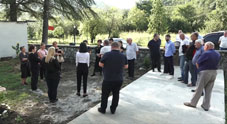
The State Minister for Reconciliation and Civic Equality visits occupation line
By Khatia Bzhalava
Thursday, September 10
On September 9th, the Minister for Reconciliation and Civic Equality Tea Akhvlediani met with representatives of Georgian checkpoint in Rukhi village and learned about the situation on the Enguri bridge on site.
The minister also visited the so-called passage of Pakhuliani-Saberio and the dividing line of Ganmukhuri-Pichori as well as the so-called checkpoints of Orsantia-Otobaia, Khurcha-Nabakevi, and Shamgona-Tagiloni, which have not been functioning for a couple of years.
The minister also visited the facilities in Rukhi, such as a multi-functional shopping center and a hospital "which has a very important meaning for people living on both sides of the dividing line."
According to the Ministry for Reconciliation and Civic Equality, together with local self-governments, the minister met with the residents of the dividing line villages, listened to their needs, and discussed the ways to solve them.
As Akhvlediani stated, she visited all of the villages along the occupation line in Abkhazia, where so-called passages existed for years and where physical obstacles are still standing, which hinders the ability of people to communicate and move freely. The minister also met with locals, who have been living under the pressure of Russian occupation for years. The locals discussed the difficulties created especially by the restriction of free movement with the minister and talked about the ways to solve them.
The Minister stressed that there are peace initiatives of the Ministry, which aim to improve the social-economic situation of people and expand the opportunities for education and development of young people living on both sides of the occupation line.
As Akhvlediani noted, the Georgian side has never quit communicating with Abkhaz people.
“We have never stopped communicating with Abkhaz community; especially, during the pandemic till today, we have accumulated crucial experience of cooperation on the issues of common interest, which gives us hope that in the future we may be able to further enhance this dialogue in order to solve the severe humanitarian condition,” said the State Minister for Reconciliation and Civic Equality and added that in order to achieve this, the ministry will work intensively within the frame of existing official formats, such as Geneva International Discussions.
Akhvlediani hopes that the Incident Prevention and Response Mechanism in Gali will be restored in the near future, which, as the minister said, has a great potential to suppress Human Right violation facts and to mitigate the current harsh humanitarian situation. She noted that by restoring free movement, enhancement of contacts between people will be significantly facilitated, "which in turn will be another solid step taken towards strengthening peace and stability."


